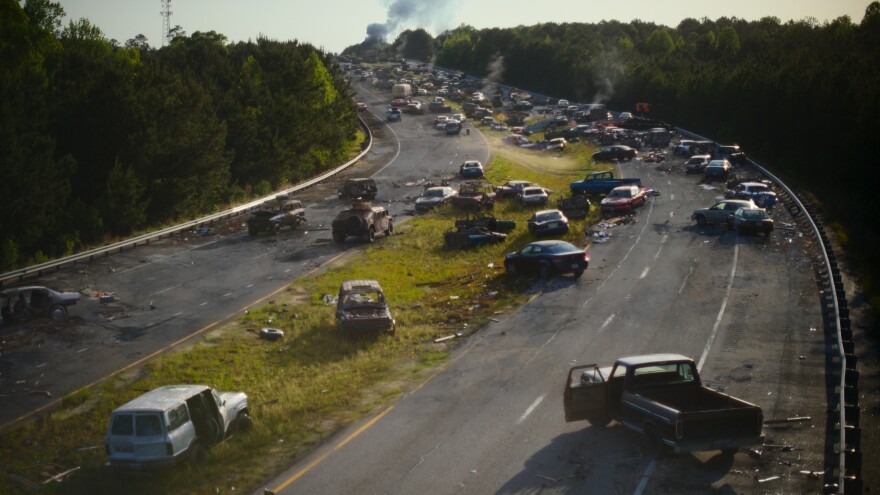Releasing a movie called Civil War in this election year is certainly one way to grab headlines. Surprisingly, though, Alex Garland's ambitious new thriller largely sidesteps the politics of the present moment.
It wants to sound a queasy note of alarm, as if the democracy doomsday scenario it's showing us could really happen, but it's hard to buy into a premise that feels this thinly sketched. The story takes place in a not-so-distant future where Texas and California have improbably joined forces and seceded from the U.S.
Florida, not to be outdone, has also broken away on its own. The president, a third-term tyrant played by Nick Offerman, has responded by calling in the troops and launching airstrikes on his fellow Americans, plunging the country into poverty and lawlessness.
Garland keeps a lot of the details vague; he's less interested in how we might have gotten here than in how we would respond. To that end, he focuses on characters whose job it is to document what's happening.
Kirsten Dunst gives a strong, tough-minded performance as Lee, a skilled photojournalist who's covered conflicts all over the world and is now confronting this nightmare on her home turf. She's headed from New York to Washington, D.C., where many expect that the war, which has been raging for some time, will end with a showdown at the White House.
Accompanying Lee on this dangerous journey are two seasoned colleagues: Joel, a wily reporter played by Wagner Moura from Narcos, and Sammy, a veteran political writer played by the always outstanding Stephen McKinley Henderson.

Per movie convention, there's also an inexperienced young outsider: Jessie, an aspiring war photographer played by Cailee Spaeny, the star of last year's biopic Priscilla. Not long into their trip, the four journalists stumble on a tense scene at a gas station where three armed men are holding two other men captive. The journalists get away without incident, but Jessie was deeply disturbed by what what was happening, started second guessing herself and didn't get the shot.
In time, Jessie gets better at her job; more than that, she becomes hooked. The movie is partly about the addictive thrill of thrusting a camera into a war zone. But it's also about the trauma and desensitization that these photographers experience as they put their emotions aside and do everything they can to get that perfect shot.
Civil War itself has been quite strikingly visualized by the cinematographer Rob Hardy and the production designer Caty Maxey. They show us an America that looks both familiar and unfamiliar, resembling the battlefields we've seen in footage from other conflicts in other places. There are surreally grim images of bloodstained sidewalks, bombed-out buildings, and a once-busy highway where rows of abandoned cars stretch for miles and miles. Garland has a real feel for post-apocalyptic landscapes, as we saw in his script for the zombie thriller 28 Days Later. In the movies he's directed since, like the brilliant Annihilation, he's shown a real talent for building suspense and anxiety.
But as stunningly detailed as Civil War's dystopia is, from moment to moment, I hardly believed a thing I was seeing. As Lee and her pals inch closer to D.C., they go from one violent set-piece to another, each one calculated for maximum terror.
There's a nasty ambush at a Christmas theme-park display in the middle of nowhere, followed by a chilling encounter with a gun-toting racist psychopath played, in a mordant touch, by Jesse Plemons, Dunst's off-screen husband. The result is more of a button-pushing genre exercise than a serious reckoning with the consequences of the movie's premise. By the time the characters arrive at their destination, just in time for a daring raid on the White House, Civil War feels ever more like an empty stunt — a thought experiment that hasn't been especially well thought out.
If there's one thing that keeps you watching, though, it's Dunst's performance as a battle-scarred professional doing her job under horrific circumstances that she's too numb to feel horrified by. As she showed in her great performance in Lars von Trier's Melancholia, there's something about Dunst that's particularly well suited to apocalyptic material. I wish her better vehicles than Civil War in the future, but it's gratifying to see her anchor a major movie regardless. She's an actor I'd follow to the end of the world and back.
Copyright 2024 Fresh Air. To see more, visit Fresh Air.



